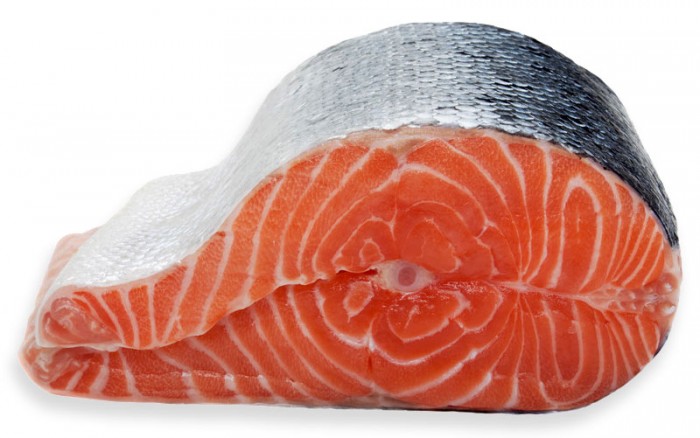Allergy to finned, scaly fish, such as tuna, salmon and cod, affects at least 0.5 percent of the population. The majority of people who are affected react badly to the protein found in the flesh of fish, although some have a reaction to gelatin which is found in the skin and bones, possibly because it has been in contact with other parts of the fish.

The condition can be found in both children and adults, but is most common in adults, with a relatively high proportion of those affected diagnosed later in life, so just because you have eaten fish without a reaction for years does not mean that you cannot develop the condition.
Some people are so sensitive that even the smell of fish cooking, exposure to utensils with which it has been prepared, or a kiss from somebody who has recently eaten fish can cause a reaction.
This particular allergy carries a relatively higher risk of anaphylaxis, a severe, life-threatening reaction than many other food-related allergies.
Fish Allergy Symptoms
Symptoms usually appear very soon after exposure, although occasionally there may be a delay of as much as 24 hours.
Symptoms can include tingling in the mouth, nausea, stomach cramps, diarrhea, a blocked or runny nose, flushing, swelling of the lips, swelling of the throat, face or eyes, itchy eyes, hives, wheezing, and in extreme cases anaphylaxis.
Anaphylaxis
Anaphylaxis is a severe, often sudden reaction where the body goes into shock. It can be life-threatening and should always be treated as a medical emergency.
Symptoms may include general distress, difficulty breathing, tightness or a lump in the throat, a fast pulse, a drop in blood pressure, fainting and loss of consciousness. Victims sometimes describe feeling a strong sense of doom.
A person who has had only a mild reaction to fish in the past is still at risk of anaphylaxis in the future.
Those who have been diagnosed as at risk of anaphylaxis will have been prescribed equipment for self-administration of Epinephrine (known as Adrenaline in the UK and Australia) in the form of an EpiPen/ Auvi-Q etc., for immediate use once the first symptoms appear. Follow medical advice on how and when to use it. If you think that you are at risk, consult your medical practitioner.
If anaphylaxis is suspected, an ambulance should be called immediately, and the patient should be taken into emergency care, whether or not Epinephrine has been administered.
Diagnosis
If you suspect that you may be allergic to fish, visit your doctor for referral to an allergy specialist. The allergist may conduct a skin-prick test, blood tests or a food-challenge test, where you are given small amounts of food to eat to observe the reaction. The food-challenge test should only be done in conditions where you are being closely monitored by a medical practitioner, with emergency medication at hand.
Treatment
Treatment of mild symptoms, such as hives, skin rash, blocked or runny nose might involve the use of antihistamines. More severe symptoms may require emergency medical care.
Avoidance of products which may cause a reaction
Avoidance of fish known or suspected of causing a reaction is essential.
Different types of fish
Although some people are only sensitive to some types of fish and not others, you should never assume that this is the case. It is best to avoid all types of finned scaly fish unless your doctor advises otherwise. The risk of a severe reaction is too great. Fish allergy is not to be confused with shellfish allergy. Shellfish such as lobsters, crayfish and shrimp are biologically different to finned scaly fish, and although many people are allergic to shellfish, they are not necessarily allergic to fish. If in doubt consult a medical practitioner.
Hidden sources of seafood
Always read labels carefully. As well as avoidance of obvious products containing fish, such as fish nuggets, sushi etc., watch out for products such as Worcester sauce, some barbeque sauces, Caesar and other salad dressings, pet food, oyster sauce, caponata, potato chips and prawn crackers. Some pasta sauces contain fish, and many pizzas have anchovy or other fish toppings. Seek medical advice as to whether it is safe to use fish oil supplements. Gelatin may contain or be contaminated with fish products. Check with manufacturers before eating gelatin products such as sweets, marshmallows and jellies.
Some cosmetics, such as lip-gloss or lip balm may contain fish products. Check with manufacturers before use. Even some medicines may contain fish products so advise your doctor of your condition whenever being prescribed medication.
Outside the home
Tell family, friends and colleagues of your condition. When children have a fish allergy, their school and other carers should be informed. You may need to avoid locations where fish is cooked. The fumes given off when fish is being cooked, particularly when being barbequed or grilled can trigger an allergic reaction in some people.
When eating out it is best to warn your host or the restaurant of your allergy. If the same chopping board, pan or skillet is used to cook fish and other food, this may give rise to an allergic reaction. Do not eat in restaurants where the staff appear unsure or unhappy with your instructions to avoid fish.